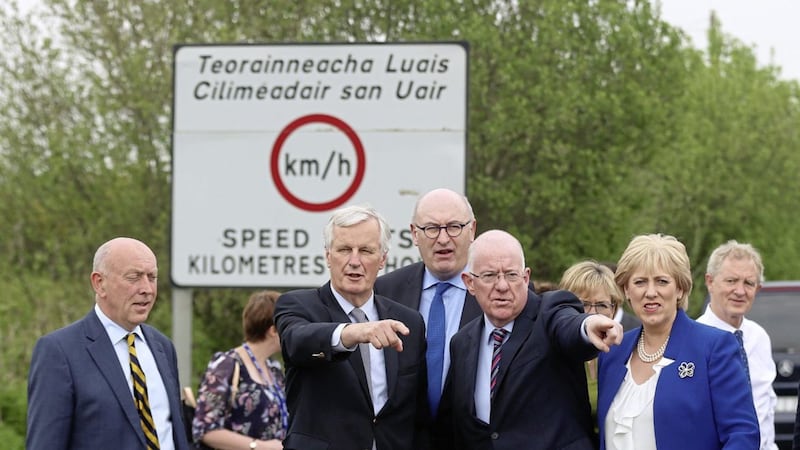Dublin politicians have made an amazing new discovery. It is called the border. Almost a hundred years since Britain imposed it and twenty years after nationalists voted to keep it, the great and the good in Dublin have discovered that partition is real and not just an election slogan.
To learn more about their new discovery, they recently asked two men to explain how it will work post-Brexit. The first was former right wing, French politician, Michel Barnier, who is the EU's Brexit negotiator.
Like President Kennedy and Nelson Mandela (who were both elected), Barnier (who is not elected) addressed the Dáil and Seanad. He said it was definitely a real border.
To see just how real it is, they all went to look at it (it was in a field) and they agreed that it is about to become a very bad border indeed. However, they also said that it should stay and that a border poll would be a terrible idea, probably even worse than the border itself.
The second man invited to enlighten Fine Gael about the border was Tony Blair, a former right wing, English politician. Mr Blair, you will remember, sent a note to President Bush before their joint illegal invasion of Iraq saying, "I will be with you, whatever." Mr Blair, as you can see, has sound political judgment.
He too said that the border was terrible. However, he said it should stay, because it is written into the Good Friday Agreement, although parts of that agreement might now have to be rewritten. (Hopefully, that will not make him part of the anti-agreement axis.)
So how do you solve a problem like the border? Nobody in Dublin wants it, but equally no one wants to get rid of it. Bertie Ahern says we need imaginative solutions, but so far we have only heard two ideas: a hard border and a soft border. (If we have a border poll, will it ask us to rank our preferences, in terms of hard, soft or none?)
The arguments against a hard border are that it would seriously disrupt trade within Ireland (which is true) and that it would lead to violence (which is untrue, unless lorry drivers start attacking customs posts). However, the chances of a hard border are slight. Theresa May's current stance on Brexit is more a ploy to gain a significant electoral majority, than a serious attempt at negotiation.
The second option is a soft border, which appears to mean one of two things. The first is that there will be no border delays for goods or people, because it will all be handled by computers.
This is great news, although it may be rather costly, for example, for people living in Cullaville, on the border, to require a computer to cross the road - and if someone hacks into the system, people could be stranded on one side of the road for days.
The second interpretation is that the north would be given hitherto undefined special status within the EU (and the UK) to allow unhindered cross-border trade. It is not clear how this would impact on trade with Britain, but we might become like a border field, where cattle can enter through one gate from the north and exit through another into the south. Ireland's fourth green field may become a grazing area for goods.
A third option is to have no border, but Dublin politicians tend not to consider this, presumably because it would annoy Arlene Foster. (She's the dark haired one.)
One way to achieve this would be to extend the north's proposed special economic status to all of Ireland, in which the south would end political union with 27 countries, but retain its economic, trade and customs union with them.
The idea requires further intensive study, but post-Brexit, it could mean an economically united Ireland, with no internal border and with full trading rights with both the EU and Britain. It would preserve Irish political independence and military neutrality and allow the development of a genuine all-Ireland economy
Of course, in terms of imaginative solutions, this is unimaginable. Dublin wants the border problem solved without leaving its comfort zone. However, if the post-Brexit border is a problem for Ireland, then all of Ireland must be part of the solution.
For that reason, Dublin might be better seeking to address the post-Brexit border within Ireland rather than relying on Blair and Barnier for advice. Or do nationalist political parties, north and south, need the border so much for electoral purposes that they cannot afford to do without it?









